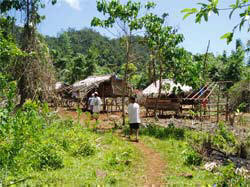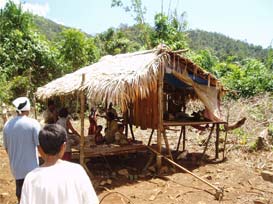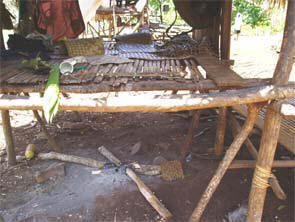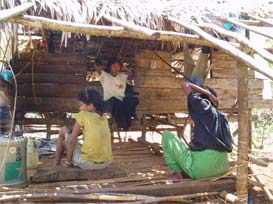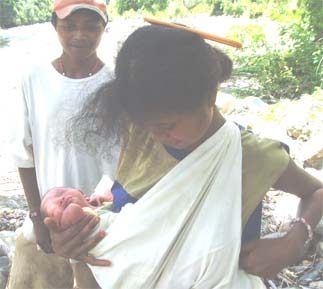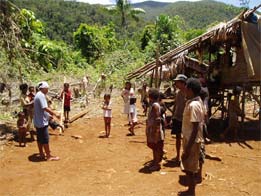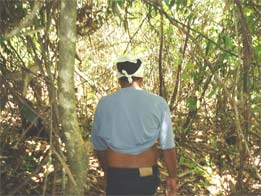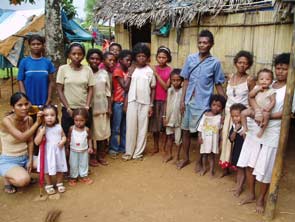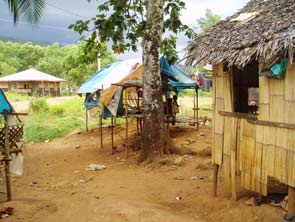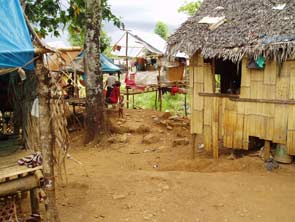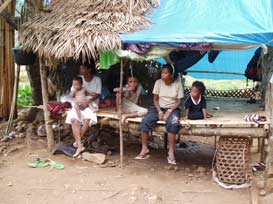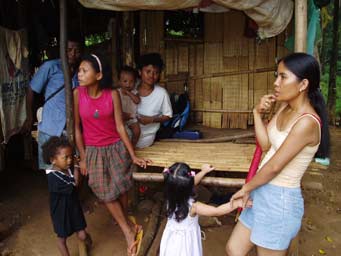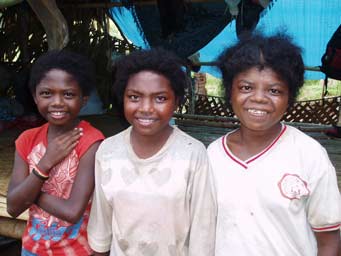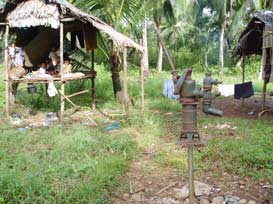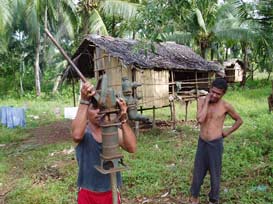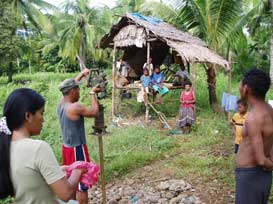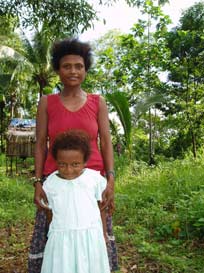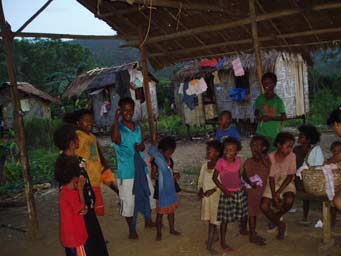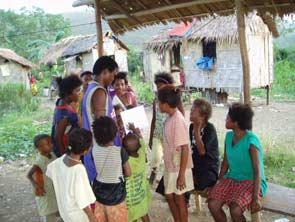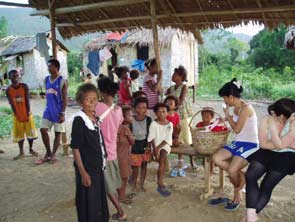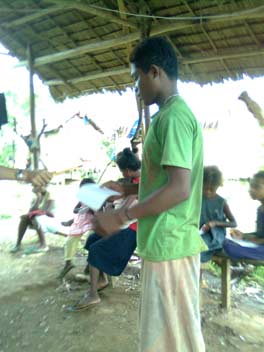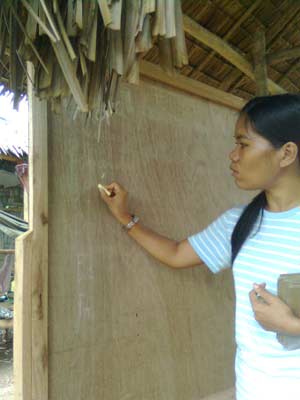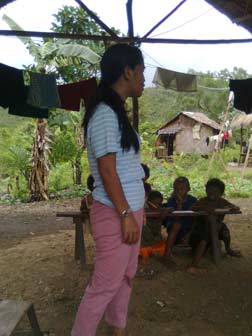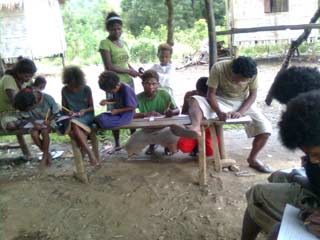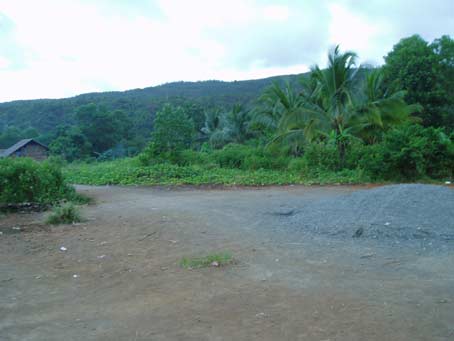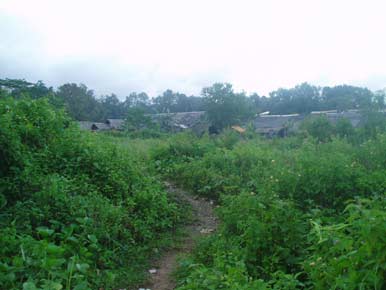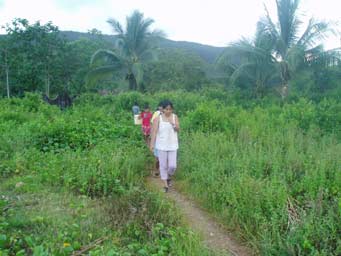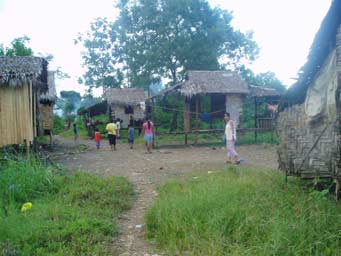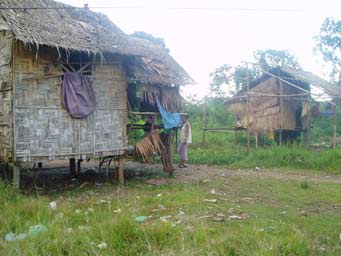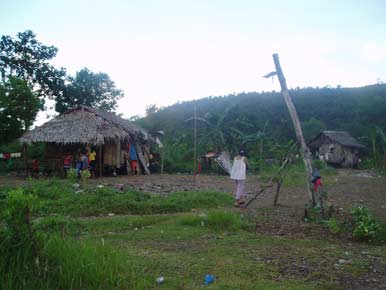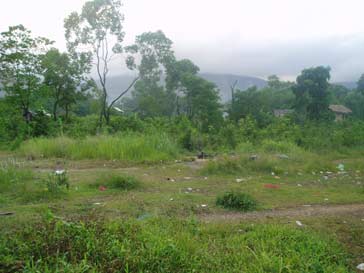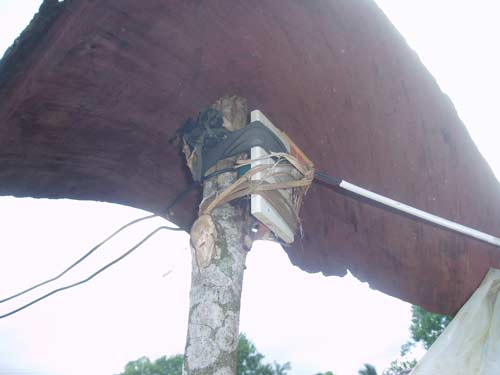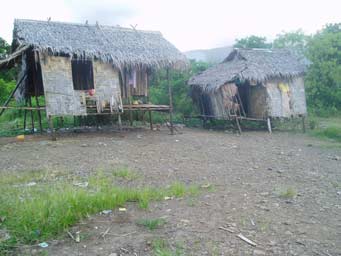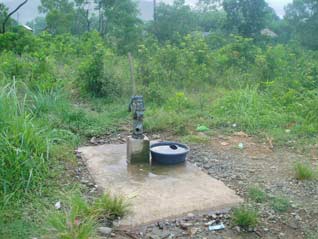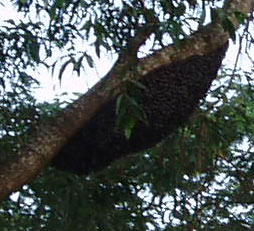

FTMW - Filipino Tribe Mission Welfare
Mamanwa Pantukan
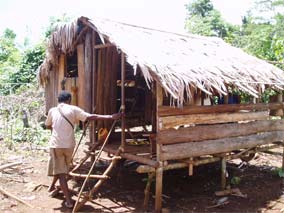
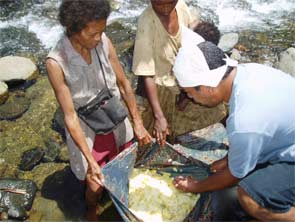
Settlement
|
The Mamanwa tribe which has settled down outside the small village of Pantukan in Surigao del Sur, the tribe we call Mamanwa east, has shown an enormous developed inventiveness in spite of that they never had bent educated in school or had a permanent settlement but, bent roaming around in the rain forests between their plantations. Until the new year of 2005/2006 the tribe has been roaming around in the rain forests without any permanent address, but between several temporary settlements. Some of them known nearby Kabangahan, Nueva Campo and Pantukan, but also newer such as Babuyan. When representatives for the eastern tribal clan raised the question about the possibility to get help with food and education for their children with the former president of FTMW, he said to them to consider the possibility to create a permanent living, as he added; -if we register your children and receives a sponsor for them, how will we be able to find you if you have no living any place? The tribe observed this and we has now the privilege for the first time in the history (even if we are a small newly founded organisation) to show a settlement created by the hands of the Mamanwa tribe themselves. Settlements for Mamanwa exist both in Taganito and Urbitztondo, Surigao del Norte, as well, but in these cases has a company built up the houses. On other places, like in Lake Mainit, Surigao del Norte, has local government unit contributed. Following you can see the development too, from Pantukan to Adlay, where FTMW representative, Thor Klaveness, in 2009 introduced abilities to receive help from NCIP to the Village Captain of Adlay. And, since then, a new settlement has been built twice in Adlay to help Mamanwa tribal to come closer to the Elementary school. The first settlement was destroyed since CTP Mining Company needed the place for their office and workshop, why the tribal were moved some hundred meters southeast of the previous location. At the new place, 15 Nipa houses were provided, but since typhoon and hard rain last December, 2011, it has yet in July, 2012, been no efforts from the side of the community or CTP Mining Company to give help to rebuild the settlement. CTP has now moved their office out of the village, but still some workshop activities remain. Our education through FTMW has therefore no school building at the moment but, is now crowding together in a Nipa house of one of the Mamanwa families. |
2005 - 2006 Settlement 1 km outside Pantukan |
|
|
The land were Mamanwa has settled down is owned by a man belonging to the tribe of Manobo. He is very positive to that Mamanwa finally want to settle down, why he has given them space both for settlement and cultivation. |
|
|
|
The houses is very simple. They consist of a frame which floor is lifted to avoid reptiles. The roof is of a kind called Nipa roof i.e. leaves folded over a strip of wood and which is laid down on and up to give a rainproof roof. A partition is built in wood while the sidewalls has coverings/tarpaulins which can be opened/closed depending on the weather situation or when it is time to sleep. |
|
|
|
Mamanwa builds their houses in two floor levels. The lower works as a living room while the upper is a sleeping room. Under the sleeping room on the ground they light up a fire which live coal keeps the mosquitoes away but also keeps them warm during the colder night. |
|
|
|
The living room gives shelter both against the rain and the hot sun. Here people is gathered, spend time together and discuss things. | |
|
|
A new member of the Mamanwa tribe was born while we visited them in may 2006. Here the parents is proudly showing their four days old baby daughter. |
|
|
|
In 2006, Ebenezer P. Morales from GNCC gathered the members of the Mamanwa settlement every week for courses in agricultural issues while his church ran the school for the children in the settlement, plus some children in the neighbourhood from the Manobo tribe. Teacher in the school was Phoebe Grace B. Montañes. |
|
|
|
The road to the new settlement of Mamanwa Pantukan is partially on tracks through thick vegetation. | |
2007 - 2009 Initial settlement in Adlay |
||
|
|
In 2008, FTMW took up issues of Mamanwa since GNCC withdraw. Former teacher from GNCC, Phoebe Grace B. Montañes, had moved to Cebu City, and it became hard to pursue after a case of corruption, in which several involved resigned. During second half of 2008, and first half of 2009, Jovelyn Klaveness assisted Mamanwa in matters of medical aid and nourishment in cooperation with doctors from Cantilan, Surigao del Sur. | |
|
|
During 2008 and 2009, the settlement in Adlay grew successively bigger, but only by the handcraft of Mamanwa themselves. No assistance from LGU or any NGO was seen. This is the lower settlement. | |
|
|
During 2008 and 2009, the settlement in Adlay grew successively bigger, but only by the handcraft of Mamanwa themselves. No assistance from LGU or any NGO was seen. | |
|
|
During 2008 and 2009, the settlement in Adlay grew successively bigger. This is one of the houses with Nipa roof and not yet finished walls. | |
|
|
During 2008 and 2009, the settlement in Adlay grew successively bigger. This is another of the houses. | |
|
|
During 2008 and 2009, the settlement in Adlay grew successively bigger. Some of the children FTMW supplied for Elementary School education. It is still problem due to discrimination in the school, both by other children that is stirred up by their parents, as teachers who do not know really how to teach Mamanwa children. | |
|
|
During 2008 and 2009, the settlement in Adlay grew successively bigger, but only by the handcraft of Mamanwa themselves. This is the higher settlement during a repair of a water pump, supplied by FTMW. | |
|
|
During 2008 and 2009, the settlement in Adlay grew successively bigger, but only by the handcraft of Mamanwa themselves. This is the higher settlement during a repair of a water pump, supplied by FTMW. | |
|
|
During 2008 and 2009, the settlement in Adlay grew successively bigger, but only by the handcraft of Mamanwa themselves. This is the higher settlement during a repair of a water pump, supplied by FTMW. | |
|
|
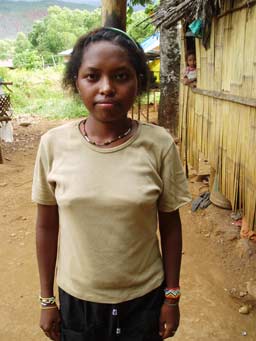 |
Mother with child from upper settlement, and a teen from the lower settlement. The teen were one of FTMW supported children for Elementary education. |
|
|
||
2010 - Present settlement in Adlay |
||
|
|
In 2010, the village council of Adlay got a contribution from NCIP Regional office, so that they could build 15 new houses. The two settlements was in the same time moved together to the boundary between Adlay village and the rain forest, where it was said that Mamanwa should have ability to cultivate and seed, but Mamanwa chieftain complained that the soil was not good enough to grow their herbs. They had to move their plantations up in the mountains. | |
|
|
When Thor and Jovelyn Klaveness visited in 2011, they were asked to overtake responsibility on education and aid, since Mamanwa tribal had no confidence with DepEd and local government. FTMW tries to build bridges between tribal and local services, as school education, midwifery, medical aid and social service to ease the relation between different actors. | |
|
|
When Thor and Jovelyn Klaveness visited in 2011, they were asked to overtake responsibility on education and aid, since Mamanwa tribal had no confidence with DepEd and local government. FTMW tries to build bridges between tribal and local services, as school education, midwifery, medical aid and social service to ease the relation between different actors. | |
|
|
FTMW start adult education on November 21, 2011. The education is held on Mondays, full day as long as possible. Interruptions due to weather conditions and other circumstances, but in case we try to come another day, not to lose too much time. It is still hard to get adult to come on lessons, since they are needed for food supply on an everyday basis. But, since children abandon school due to discrimination, we do prepare them with the hope that they soon will be incorporated in the Elementary public education. FTMW tries to build relations to teachers and principals within both Elementary School, and High School of Adlay for future development. | |
|
|
FTMW start adult education on November 21, 2011. The education is held on Mondays, full day as long as possible. Interruptions due to weather conditions and other circumstances, but in case we try to come another day, not to lose too much time. It is still hard to get adult to come on lessons, since they are needed for food supply on an everyday basis. But, since children abandon school due to discrimination, we do prepare them with the hope that they soon will be incorporated in the Elementary public education. FTMW tries to build relations to teachers and principals within both Elementary School, and High School of Adlay for future development. | |
|
|
FTMW start adult education on November 21, 2011. The education is held on Mondays, full day as long as possible. Interruptions due to weather conditions and other circumstances, but in case we try to come another day, not to lose too much time. It is still hard to get adult to come on lessons, since they are needed for food supply on an everyday basis. But, since children abandon school due to discrimination, we do prepare them with the hope that they soon will be incorporated in the Elementary public education. FTMW tries to build relations to teachers and principals within both Elementary School, and High School of Adlay for future development. | |
|
|
FTMW start adult education on November 21, 2011. The education is held on Mondays, full day as long as possible. Interruptions due to weather conditions and other circumstances, but in case we try to come another day, not to lose too much time. It is still hard to get adult to come on lessons, since they are needed for food supply on an everyday basis. But, since children abandon school due to discrimination, we do prepare them with the hope that they soon will be incorporated in the Elementary public education. FTMW tries to build relations to teachers and principals within both Elementary School, and High School of Adlay for future development. | |
|
|
To come to the new settlement, it is needed to walk over the old foundation of the former Plywood factory. | |
|
|
To come to the new settlement, it is needed to walk over the old foundation of the former Plywood factory. The houses seen belong partly to CTP Mining Company's workshops. The view is from Mamanwa settlement towards the village. | |
|
|
To come to the new settlement, it is needed to walk over the old foundation of the former Plywood factory. Here we come from the settlement of Mamanwa on the way back to the village. | |
|
|
Most of the houses are now destroyed by the strong winds during the December 2011 typhoon. | |
|
|
Most of the houses are now destroyed by the strong winds during the December 2011 typhoon. | |
|
|
During a typhoon in December 2012 our 'school house', as seen above, was totally destroyed, and left is only a stand with a lamp. The electricity was too interrupted, but we had to fix it our self, since now, the Village council will not do any aid due to lack of money, according their own information by Village Captain. | |
|
|
During a typhoon in December 2012 our 'school house', as seen above, was totally destroyed, and left is only a stand with a lamp. The electricity was too interrupted, but we had to fix it our self, since now, the Village council will not do any aid due to lack of money, according their own information by Village Captain. | |
|
|
During a typhoon in December 2012 our 'school house', as seen above, was totally destroyed, and left is only a stand with an electric socket. The electricity was, too, interrupted, but we had to fix it our self, since now, the Village council will not do any aid due to lack of money, according their own information by Village Captain. | |
|
|
Most of the houses are now destroyed by the strong winds during the December 2011 typhoon. | |
|
|
Fresh water pump, built during the establishment of the settlement in 2010 supported by the village council. | |
|
|
Dangerous wasps residing in a tree in the entrance of the Mamanwa settlement. | |
|
|
||
If you find this work interesting, you are very welcome to become a donor.
- Donations can be paid to us in EURO on followed account:
- IBAN SE31 9500 0099
6042 0418 2960
SWIFT (BIC-Code): NDEASESS - Bank: NORDEA Sweden
- For further information, please contact:
| FTMS Filipino Tribe Mission Sweden Reg. No: 802422-2393 | ||
Att: Klaveness |
Phone: | +46 760 675 238 |
| Cell Phone: | +46 705 987 266 | |
| E-mail: | ftms@tribemission.com | |
| SWEDEN | WORLD & EUROPE € | |
|
|
|
Send
E-mail if you
have queries or comments about this website.
